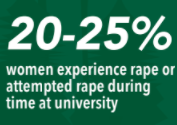Changing the Landscape: 54 years after America criminalized sexual assault, it remains a prevalent workplace issue

March 8, 2018
A never-before seen campaign is waking up the world to the struggles of women in the workplace faced with the harmful actions of the powerful—from the moguls of Hollywood to the tech giants of Silicon Valley—and it all started with a single hashtag on Twitter: #MeToo.
Previously silenced with threats of ostracism, rumors of individuals’ predatory natures are becoming empowered accusations. In October of 2017, reports detailing sexual assault al legations against entertainment mogul Harvey Weinstein kindled an activist spark that ignited the internet. The phenomenon, pushed to the forefront of American awareness by social media users and widespread news coverage, spread across platforms and enveloped the world.

In the following months, numerous other accusations arose. Some were directed at men like Weinstein, who held positions of power in the entertainment industry, while more allegations—some of great magnitude—surrounded politicians, comedians, media leaders and other prominent figures. Former USA Gymnastics doctor Larry Nassar was sentenced to prisonin January after more than 150 women and girls accused him of sexual abuse in court.

The allegations against men of authority propelled an awareness of the prevalence of sexual violence into the limelight, spurring activism and empowering survivors of all genders.
Survivors who shared whisper networks (informal webs of warnings about male coworkers and bosses to be wary of) and voiced their stories of sexual assault were featured in Time Magazine as the collective “Person of the Year” last year: the Silence Breakers. #MeToo and its various incarnations, including the #TimesUp campaign, served as the focal point of the 2018 Golden Globe Awards and continue to trend on social media outlets.
Advocates and allies campaigned for inclusive policies aimed at reducing rates of sexual misconduct from the tech industry to the college campus.

This activism might seem separate from our reality. But sexual assault and discrimination also keenly affect the environments that many upper school students live in now or will in the next five years.
Over the past year, survivors bolstered by the extensive reach of #MeToo have come forward not just in the entertainment industry, but also on college campuses across the nation.
“Schools need to report when they have sexual assault cases so that the problem can be highlighted and, from the administrative standpoint, they need to be transparent about the rates of sexual assault on campus,” National Women’s Law Center public policy fellow Miquel Davies said. “Education is step one to address the issue so that more people know about it.”
Organizations like End Rape on Campus (EROC) aim to address this important issue.
“When women say, ‘hey, this person has sexually harassed me’, or when women say, ‘I can’t get an education because the environment is so hostile that I can’t pay attention in class’, then we need to believe them and see what we can do as individuals. Being an ally is as simple as recognizing a person’s experience and [affirming] it,” said EROC project manager Chardonnay Madkins.
Additional reporting by Jin Tuan and Anya Weaver.
Q&A with startup CEO and activist combating workplace sexual violence
Rachel Renock, 27, is the CEO and creative director of startup Wethos, a company that connects nonprofits with freelance professionals. Renock has been featured in The New York Times and on NBC for her activist efforts to combat sexual violence in the workplace.
Winged Post: Within the past year, sexual assault against women–from corporate tech to the entertainment industry–has been pushed into the limelight. Why now?
Rachel Renock: I think it’s a couple of different things. Firs and foremost, women are finally
getting into positions of power–we are vice presidents, we are executives. Although the struggle to get there was hard, we are getting there, and I think the women who have made it that far are now using their power to change the culture they had to live with for so long. I think the second part of it is a cultural perspective; we’re seeing a huge shift from ‘believe him’ to ‘believe her.’ And I think the third is a generational shift. There is a younger group of women emerging that believe that they deserve better. I am 27, and you know when I talk to many women in the older generation, they are kind of still in the camp of like ‘it is what it is, and this is how the world is.’ I think that a new generation is coming through and saying ‘it’s 2018. We don’t deserve to be treated this way anymore.’”
WP: Why is sexual harassment such a prevalent issue in the tech industry?
RR: Tech is very male-dominated, especially in positions of power, and all the money is held by men, and other men are tasked in distributing that money. A really intense power dynamic is going on in tech, but that power dynamic goes across many different sectors. These companies go up so quickly and scale so quickly, so there’s not a lot of time to think about policies and company structure and diversity, and in terms of how we’re treating women in the industry in particular, that “frat boy” culture– ‘we’re going to party, make a company, and get rich’–
completely objectifies women and comes down to women receiving the brunt of all the backlash that comes with that.
WP: What steps should be taken to reduce rates of sexual violence within the industry?
RR: The number one solution to all of these things, beyond a change in policy and culture, is that there has to be consequences to these actions– that’s the only way to get people to stop doing this. People should feel that if they associate with or become a sexual predator, then they know they are going to be outcasts in society. Unless we instill these consequences, unless we hold people accountable, there is nothing stopping anybody from continuing this kind of behavior.
This piece was originally published in the pages of The Winged Post on March 6, 2018.


















![“[Building nerf blasters] became this outlet of creativity for me that hasn't been matched by anything else. The process [of] making a build complete to your desire is such a painstakingly difficult process, but I've had to learn from [the skills needed from] soldering to proper painting. There's so many different options for everything, if you think about it, it exists. The best part is [that] if it doesn't exist, you can build it yourself," Ishaan Parate said.](https://harkeraquila.com/wp-content/uploads/2022/08/DSC_8149-900x604.jpg)




![“When I came into high school, I was ready to be a follower. But DECA was a game changer for me. It helped me overcome my fear of public speaking, and it's played such a major role in who I've become today. To be able to successfully lead a chapter of 150 students, an officer team and be one of the upperclassmen I once really admired is something I'm [really] proud of,” Anvitha Tummala ('21) said.](https://harkeraquila.com/wp-content/uploads/2021/07/Screen-Shot-2021-07-25-at-9.50.05-AM-900x594.png)







![“I think getting up in the morning and having a sense of purpose [is exciting]. I think without a certain amount of drive, life is kind of obsolete and mundane, and I think having that every single day is what makes each day unique and kind of makes life exciting,” Neymika Jain (12) said.](https://harkeraquila.com/wp-content/uploads/2017/06/Screen-Shot-2017-06-03-at-4.54.16-PM.png)








![“My slogan is ‘slow feet, don’t eat, and I’m hungry.’ You need to run fast to get where you are–you aren't going to get those championships if you aren't fast,” Angel Cervantes (12) said. “I want to do well in school on my tests and in track and win championships for my team. I live by that, [and] I can do that anywhere: in the classroom or on the field.”](https://harkeraquila.com/wp-content/uploads/2018/06/DSC5146-900x601.jpg)
![“[Volleyball has] taught me how to fall correctly, and another thing it taught is that you don’t have to be the best at something to be good at it. If you just hit the ball in a smart way, then it still scores points and you’re good at it. You could be a background player and still make a much bigger impact on the team than you would think,” Anya Gert (’20) said.](https://harkeraquila.com/wp-content/uploads/2020/06/AnnaGert_JinTuan_HoHPhotoEdited-600x900.jpeg)

![“I'm not nearly there yet, but [my confidence has] definitely been getting better since I was pretty shy and timid coming into Harker my freshman year. I know that there's a lot of people that are really confident in what they do, and I really admire them. Everyone's so driven and that has really pushed me to kind of try to find my own place in high school and be more confident,” Alyssa Huang (’20) said.](https://harkeraquila.com/wp-content/uploads/2020/06/AlyssaHuang_EmilyChen_HoHPhoto-900x749.jpeg)









